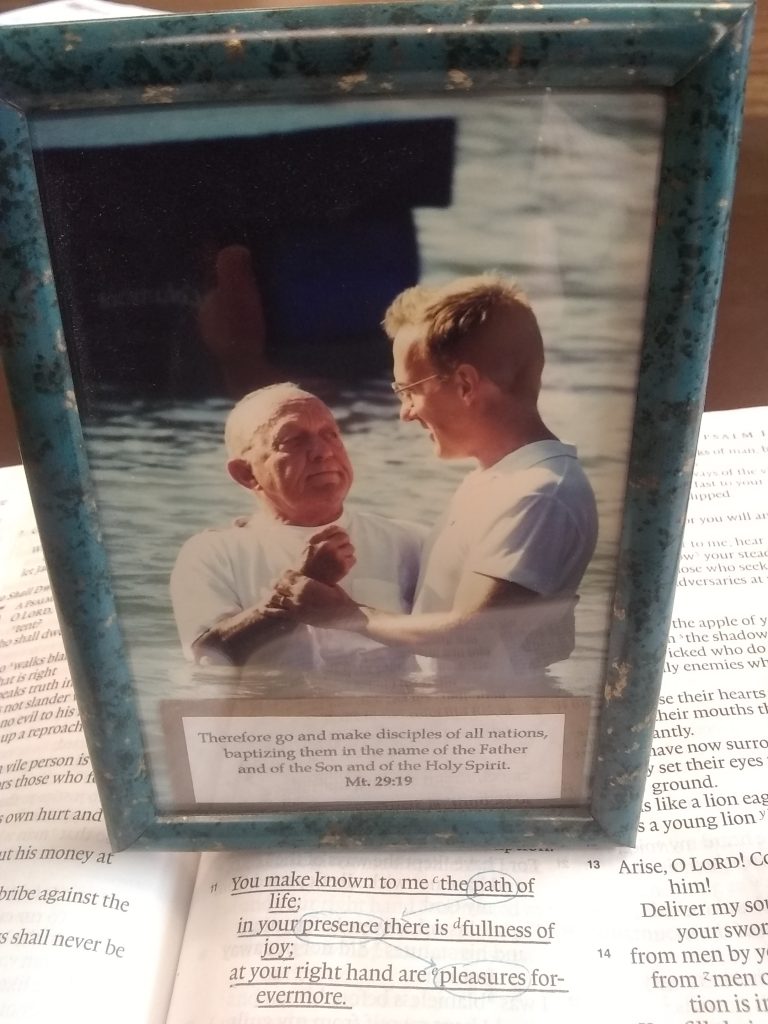This year as Resurrection Sunday approached I had a phrase of Scripture repeatedly pop into my mind: “the living God.”
I went searching through the Bible and discovered it occurs twenty-eight times in the Scripture (ESV). It is like a vein of gold running from cover to cover (literally, from Deuteronomy to Revelation).
The Bible sets “the living God” over against “vain” idols (Acts 14:15). God alone, uniquely is “the living God.” There is no other. Idols, whatever form they take, are “vain.” That is to say, they are empty. They are non-existent, except as a figment of the imagination in the minds of those who attribute being to them. They are nothing. They can do nothing. They are a lie.
God, on the other hand, is “the living God.” He is. He lives, moves, acts, speaks, does. He is alive, present, and active. God is self-existing.
God possesses life in a way that is unique to Him alone. Jesus said, “the Father has life in himself” (John 5:26). His life is not a derived thing; it is not a contingent thing. God’s life is dependent upon nothing external to Himself. That is why when He revealed Himself most intimately and personally to Moses He called Himself “I AM.” He declared, “I AM WHO I AM” (Ex. 3:14). Not, “I was.” Nor, “I will be.” But “I AM”—ever, always, perpetually, without end He “is.”
The psalmist declared to God, “with you is the fountain of life” (Psalm 36:9). Paul said, “he himself gives to all mankind life and breath and everything” (Acts 17:25). This means that our life is a derivative, contingent thing. Job affirmed, “In his hand is the life of every living thing and the breath of all mankind” (Job 12:10). Our life, then, is derived from “the living God.” The life you now enjoy comes from and is contingent upon Him. Your heartbeats, brainwaves, respirations continue at His will.
God possesses life as something internal, immediate, and self-possessed. It is like the difference between being the fire and sharing the flame. The “living God” gives us “life” like one lights the end of a stick from a bonfire; it can only continue to burn by remaining in the fire. But taken from the fire, that flame eventually flickers out—unless it is brought back to the fire again and again.
But what if the fire itself came to dwell in the stick? Well, it might be like a bush that burns, but is never consumed (Exodus 3:2)!
Indeed, “the living God” “alone has immortality” (1 Tim. 6:16). His, uniquely and solely, is unending, inextinguishable life.
The Bible sets “the living God” before us as a Triune being—one God, yet existing in three persons. In the pages of the Bible we meet God “the living” Father. Jeremiah declared, “The LORD is the true God; he is the living God” (Jer. 10:10a). We meet in its pages, God “the living” Son. When Jesus asked His Disciples who they believed Him to be, Peter answered, “You are the Christ, the Son of the living God” (Matt. 16:16). The Scriptures hold Him before us as God “the living” Spirit. Paul told the believers in the city of Corinth, “you are a letter from Christ … written not with ink but with the Spirit of the living God” (2 Cor. 3:3).
The Triune God is “the fountain of life” (Psa. 36:9). But Jesus promised He would be more than a fountain to which we must return again and again. He promised the one who believes in Him, that “Out of his heart will flow rivers of living water” (John 7:38). And John immediately explains: “Now this he said about the Spirit, whom those who believed in him were to receive” (v.39a).
As “the living God” He is not content to keep that life to Himself. He gave life to animate creation at the beginning, but uniquely breathed the breath of life into humans whom He’d made in His own image (Gen. 2:7). When our ancient ancestors rebelled, they incurred the judgment of “death”, a death that they passed on to every human being (Gen. 2:17; Rom. 5:17a). But “the living God” determined the sentence would not end with the period of “dead,” but with the exclamation point of “life”!
So—and here is the grand, good news (gospel)—God “the living” Father sent God “the living” Son to die for our sins. Then God “the living” Father, by the power of God “the living” Spirit, raised the Son from the dead, restoring Him to an “indestructible life” (Rom. 1:4; Heb. 7:16).
When a person hears this, believes this, and turns their whole life to Him, God plants that very, indestructible, immortal, eternal life within that person by coming Himself to take up residence within that person. We then exist not just a brand plucked from the fire, but as one with the fire itself now dwelling within! He is then to us not just a fountain to which we must return again and again, but within us has become rivers of living water!
The “living God” comes to be this life within us when we turn from “vain idols” and believe in and serve “the living God”—Father, Son, and Holy Spirit.
Allow me now to provide a quick fly-over of what the Bible teaches about how we are to live in relationship to “the living God.” Think of this as a drone’s-eye-view of things. Imagine the drone sending its video footage from far above back to your earth-bound heart.
When we repent and believe in Jesus Christ we become …
- Children of “the living God” (Hosea 1:10).
- We become “sons of the living God” (Rom. 9:26).
- That is to say, we are made family, sharing the very life of “the living God.”
- Servants of “the living God” (Dan. 6:20; Heb. 9:14).
- That is to say, we owe allegiance to “the living God.”
- We actively devote the whole of our time, talents and treasures to the mission and purposes of “the living God.”
- The Temple of “the living God” (2 Cor. 6:16).
- That is to say, we become the dwelling place of “the living God.”
- We become the very place where God delights to make His residence.
- The Church of “the living God” (1 Tim. 3:5).
- That is to say, we form that assembly of “called out” ones (for that is what the root word of “church” means).
- We are called out of death into life. We are called out of the world and its purposes into relationship to God and His purposes. We are called out of the kingdom of the evil one and into the Kingdom of God’s beloved Son.
When we repent and believe in Jesus Christ we are to …
- Fear “the living God” (Jer. 10:10; Dan. 6:26).
- Progressively, as we come to know Him more and more, we move down the continuum from terror (Heb. 10:31) to awe-struck, love-enfolded worship (Psa. 84:2).
- Listen to “the living God” (Deut. 5:26).
- To “listen” to God is to hear, heed and obey His Word, as opposed to twisting His words (Jer. 23:26) to our own ends.
- Worship “the living God” (Psa. 84:2).
- Responding to what He has revealed of Himself in His Word and becoming trumpets of His glory and worth.
- Thirst for “the living God” (Psa. 42:2).
- Finding that while as “living water” He satisfies our deepest parts, He simultaneously creates within us an ever-greater desire for Him.
- Serve “the living God” (Heb. 9:14).
- As His life becomes our life we move, act and do to pass on this life to more and more people.
- Hope in “the living God” (1 Tim. 4:10).
- “For to this end we toil and strive, because we have our hope set on the living God, who is the Savior …” (1 Tim. 4:10a)
We are all thus warned against …
- Mocking “the living God” (2 Kings 19:4, 16; Isa. 37:4, 17).
- The lowest form of “fool” in Proverbs is called the “scoffer” (e.g., Prov. 9:7-8; 13:1; 19:29).
- What else could you name one who, in the face of death, mocks the only life that survives death (1 Cor. 15:54-57)?
- Falling away from “the living God” (Heb. 3:12).
- And thus …
- Falling into the hands of “the living God” (Heb. 10:31).
- For “It is a fearful thing to fall into the hands of the living God” (Heb. 10:31), having spurned Him who alone is life.
Would you be willing to turn to “the living God”? Do you desire to receive life—everlasting, eternal, indestructible—from Him?
I invite you right now to bow your heart before Him and tell Him so in prayer. Thank Him for not leaving you in the grip and terrors of death. Thank Him for triumphing over death by the cross and in His resurrection. Turn yourself over to Him who alone is life and ask Him to bring you to new life through a living, eternal relationship with Him.





